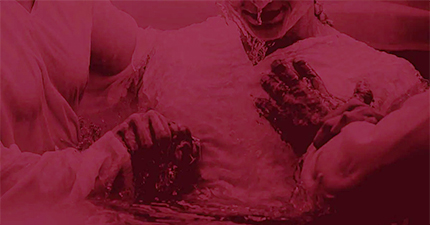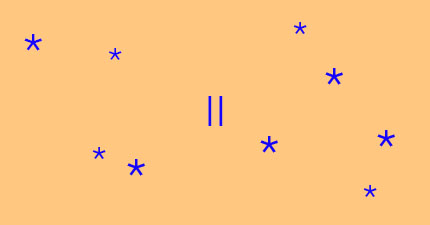Intro to the Third House
The third house is both the house of similarity and the house of difference. Audre Lorde writes in Difference and Survival:
“The house of your difference is the longing for your greatest power and your deepest vulnerability. It is an indelible part of your life’s arsenal. If you allow your difference, whatever it might be, to be defined for you by imposed externals, then it will be defined to your detriment, always, for that definition must [be] dictated by the need of your society, rather than by a merging between the needs of that society and the human needs of self. But as you acknowledge your difference and examine how you wish to use it and for what—the creative power of difference explored—then you can focus it toward a future which we must each commit ourselves to in some particular way if it is to come to pass at all.”
The third house is a social house but it is also a physical house. It has to do with both the Moon and with Mars, which are both incredibly physical planets. The name of the third house is Dea Dia, which is translated to Goddess. Which goddess? Ceres, goddess of the hearth. Ceres was celebrated mostly not with public declarations but through private worship. The third house has to do with rituals but only with those rituals that are done in private—eating, sex, birthing, and mourning.
But the third house is also the house of travelers—not traveling, which is signified by the ninth house but travelers. Travelers are strangers. When Sara Ahmed writes about the stranger, she writes that, “The figure of the stranger is familiar; the stranger is thus someone we recognise (as a stranger) rather than someone we do not recognise.” Strangers are strangers because they are recognized as unrecognizable.
And, finally, the third house rules siblings, cousins, and peers. Whenever a house rules relationships in astrology, it is important to remember that it doesn’t rule a particular relationship in your life but a way of relating. Relationships are a universe in and of themselves, with people challenging your Venus in a certain way or bringing out a Mercury—Saturn conjunction in another. The relational houses have more to do with how sociality is taught to you.
The Third House Changes
The third house rules siblings—in the first phase of life, it rules older siblings, then middle, and then finally younger. The third house is about conflict through similarity and conflict through difference. This is a fast moving house, sextiled to the ascendent, where we feel like we’re feeling catch up with everything that is going on.
When we’re younger, the third house is about subculture. Subculture is an act of establishing affinity without territory. Subculture is about claiming relationships without claiming property. There’s a freeness in subculture, a sacrilegiousness, and an obstinacy. There’s a rigidness to subculture because, unlike culture, subculture is not established through geographical location or a nation-state but through its codes of conduct. Subculture is as much about alienation as it is about belonging—as much about conflict as much as interest.
It’s when we get older that the third house becomes private and, as it becomes private, becomes also physical. The third house is about all of those beautiful rituals, such as candle lighting and body buttering and fruit eating but it is about the ugly ones too. The third house is where shitting, brawling, and crying happens. You see, the body does not merely reside in the third house. It is built by the third house.
And then, I think that is where the strangeness of the third house sets in. When you are responsible for building your own body, you are given the ability to view your body as a stranger. Bodies become strange when they become bodies that we are not taught to recognize and we are not taught to recognize bodies in their entirety at all. The messiness of the body, the grossness and the illnesses of the body—it’s sexualization and its racialization. This is what lives in the house of difference—bodies that we were never taught to recognize.
Mars and the Moon
Mars tries to build the Moon in the third house. Mars co-signifies the third house while the Moon rejoices here. Mars here is used specially to signify not conflict but difference. While the Sun finds support from its greater benefic in the ninth, where it rejoices, the Moon is made by its malefic.
Both Mars and the Moon have to do with difference. The Moon rules the borders while Mars is an immigrant god. Both planets are physical, with the Moon ruling the physical body and Mars ruling the body’s catharsis, because bodies and customs are where the borders are found.
Whenever a colonial population encountered a colonized one, the colonized people would be depicted through perversions of the colonial population’s social custom especially in terms of gender and sexuality. Han Chinese people discussed how indigenous Taiwanese people did not record patriarchal lineage while the British discussed the use of Irish women. Borders do not just live between nation-states and between land and the sea. They also live in customs and in bodies.
Women, or non-men, especially often live as borders. Borders are expressed, delineated, and reinforced around customs of deciding how to treat women while women themselves are expected to act as mediators or translators of difference. In many ways, the creation and construction of the woman as gender is also the creation and reinforcement of the border as custom.
So, the third house is called Goddess but it can also be called woman. No one is born as a woman but some of us are treated as women. Womanhood is a technology that deals with both translation and treason. It’s a technology that attempts to assimilate but also to provoke the borders that live within sex, within food, and within living.
Womanhood is an imagination project that surrounds the way we try to live in our bodies. It is an incredibly strange way of imagining the body because womanhood tries to reconcile consumption with culture. Maria Thereza Alves writes about the anthropological feast of culture in which differences in custom and borders become commodities that colonizing powers consume. The third house is the joy of the Moon and the Moon loves to feast.
Working with the Third House
Working with the third house has to do with the terrifying question of, “if my body is where I learn difference, if it is where I learn that I can be swallowed whole—identity and feelings and all—is where I learn that I speak most as myself when I can no longer recognize myself, then how on earth can I find safety in this body-thing?”
How can I find safety in eating? In sex? In fighting? In shitting? Most of the things done in the third house are automatic processes that require safety in order to function. You are literally unable to take a shit or have an orgasm unless you feel safe not just in the room where you currently are but also in the relationship of the people in the apartment and in your physical body. You have to understand that your roommates or family members are not going to come bursting through the door when you need privacy. You have to know that you will not ruin yourself.
The third house is about struggle because it is signified by Mars. The third house is not where you struggle to find yourself but where you struggle to make yourself. It’s where you struggle to understand a body that you could never have been taught to recognize because it is your own, living in real time, dealing with images that do not seek to represent it but to commodify it. The third house is where theft occurs—it is where you attempt to steal your existence back from its own image. The third house is where you make shit up.
For those of us who are burdened with the task of translation (and, with it, treason), for those of us who must translate our own bodies, the third house is not about conducting measured rituals with store bought products. It’s about the terror of the body and becoming familiar with that terror until it is no longer normalized. It’s about understanding that fear is boring and that, after fear is understood, that your body remains.
The third house is often described in terms of incantations, of temple rituals, of perfumes, and in terms of ceremonies. These things can matter, sure. Perfumes and beauty rituals can help you find safety in being. So can nudity or the putting on of sweaters. The third house can be about bathing and the eating of nice meals but it can also be about the eating of trash food without the need for self punishment. The third house is about the struggle of self trust and its rituals are never done, are about survival, but also about accepting that the work of living will never be accomplished.


